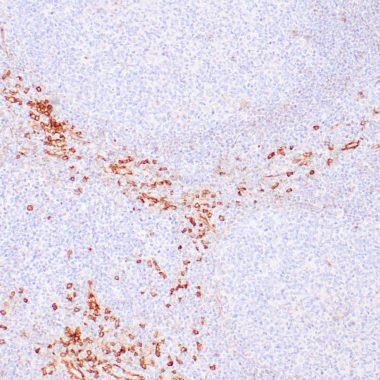
The CD123 Antibody (Mouse Monoclonal) is a highly specific and sensitive antibody to detect CD123, also known as the interleukin-3 receptor alpha chain (IL-3Rα), which is prominently expressed on plasmacytoid dendritic cells, basophils, and various hematopoietic progenitor cells. CD123 plays a vital role in cell growth, differentiation, and immune regulation, making it a critical marker in the study of hematopoiesis, immune response, and hematologic malignancies such as acute myeloid leukemia (AML) and blastic plasmacytoid dendritic cell neoplasm (BPDCN). This mouse monoclonal antibody offers robust and reproducible detection of CD123 across multiple research applications, including flow cytometry, immunohistochemistry (IHC), immunofluorescence (IF), and Western blotting. Validated for use with human and select animal tissues, this antibody provides high affinity and specificity with minimal background, ensuring precise identification and quantification of CD123-positive cell populations. It is an essential tool for researchers investigating immune cell subsets, disease progression, and therapeutic targeting of IL-3Rα. The antibody’s consistent performance in formalin-fixed paraffin-embedded (FFPE) samples further expands its utility in clinical research and diagnostics. Ideal for studies in immunology, oncology, and stem cell biology, the CD123 Mouse Monoclonal Antibody supports detailed immune profiling and contributes valuable insights into disease mechanisms involving abnormal expression of the IL-3 receptor. Researchers can rely on this antibody for accurate and sensitive detection of CD123 to advance understanding of cellular pathways and therapeutic development.
Humans; others not tested
Immunohistochemistry (formalin-fixed, paraffin-embedded tissues)
Buffer with protein carrier and preservative
Store at 2ºC to 8ºC
Lymph node or thymus
Cytoplasmic
IgG2b /κ
Recombinant fragment of human IL3RA protein (around aa 26-171)